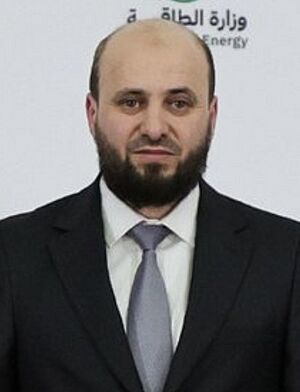Mohammed al-Bashir facts for kids
Quick facts for kids
Mohammed al-Bashir
|
|
|---|---|
|
محمد البشير
|
|

Al-Bashir in 2025
|
|
| Minister of Energy | |
| Assumed office 29 March 2025 |
|
| President | Ahmed al-Sharaa |
| Preceded by | Office established |
| Prime Minister of Syria | |
| In office 10 December 2024 – 29 March 2025 |
|
| President | Ahmed al-Sharaa |
| Preceded by | Mohammad Ghazi al-Jalali |
| Succeeded by | Office abolished |
| Prime Minister of the Syrian Salvation Government | |
| In office 13 January 2024 – 10 December 2024 |
|
| President | Mustafa al-Mousa |
| Preceded by | Ali Keda |
| Succeeded by | Position abolished |
| Minister of Development and of Humanitarian Affairs of the Syrian Salvation Government | |
| In office 2022 – 28 February 2024 |
|
| Preceded by | Unknown |
| Succeeded by | Fadi al-Qassem |
| Personal details | |
| Born | 1984 (age 41–42) Mashoun, Jabal al-Zawiya, Idlib Governorate, Syria |
| Political party | Independent (since 2025) |
| Other political affiliations |
Hay'at Tahrir al-Sham (2017–2025) |
| Alma mater | University of Aleppo (BE) Idlib University (BA) |
| Signature |  |
Mohammed al-Bashir (Arabic: محمد البشير, romanized: Muḥammad al-Bashīr) is a Syrian politician and engineer. He was born in 1984. He is currently the Minister of Energy in the Syrian transitional government. He started this role in March 2025.
Before this, he was the last Prime Minister of Syria. He led the Syrian caretaker government. This government was formed after a big change in Syria's leadership. He took over from Mohammad Ghazi al-Jalali.
Al-Bashir also served as the fifth Prime Minister of the Syrian Salvation Government. This was a civilian government in a part of Syria. He held this position from January 2024 until he became Prime Minister of Syria.
Contents
Early Life and Education
Mohammed al-Bashir was born in 1984. His village, Mashoun, is in the Idlib Governorate region of Syria. He studied electrical engineering at the University of Aleppo. He graduated in 2007.
By 2012, al-Bashir was in charge of the Precision Instruments Department. This was at a gas plant for the Syrian Gas Company. Later, he became the director of the Al-Amal Educational Institute. This institute helped children affected by the conflict in Syria get an education. In 2020, he also earned a degree in Sharia and law from Idlib University. He also got certificates in managing projects and organizing administration.
Political Career
Before becoming a minister, al-Bashir worked in the Syrian Salvation Government. He was the Director of Islamic Education for two and a half years. After that, he became the Deputy Director, then Director, of Association Affairs. This was at the Ministry of Development and Humanitarian Affairs. From 2022 to 2023, al-Bashir was the Minister of Development and Humanitarian Affairs. He served in the cabinet of Ali Keda.
Prime Minister of the Syrian Salvation Government
On January 13, 2024, Mohammed al-Bashir was chosen as Prime Minister of the Syrian Salvation Government. He focused on making government services more modern. This included using online systems. His government also lowered fees for property and made building rules simpler. They also started planning to expand the city of Idlib.
In March 2024, al-Bashir signed an order. This order allowed some prisoners to be released. These were prisoners who had not committed serious crimes.
In late November 2024, a military operation began in northwestern Syria. This led to the capture of Aleppo. This greatly increased the areas controlled by the Salvation Government. Al-Bashir said this operation was a response to attacks on civilians. He stated that these attacks had forced many people to leave their homes. On December 4, 2024, al-Bashir visited Aleppo. He oversaw the reopening of government offices there. He also praised the workers who returned to their jobs.
Prime Minister of Syria (2024–2025)
On December 9, 2024, a major change happened in Syria's government. Mohammed al-Bashir was asked to form a new government. He met with Hay'at Tahrir al-Sham leader Ahmed al-Sharaa and the previous Syrian Prime Minister, Mohammad Ghazi al-Jalali. They worked together to transfer power peacefully.
The next day, December 10, 2024, he was officially named the Prime Minister of Syria. He led the new caretaker government. Al-Bashir announced that officials from his Salvation Government would take on similar roles in the new government.
The old Syrian constitution was no longer used. A new constitution was put in place in 2025. This new constitution created a presidential system. In this system, the president holds most of the power. The president appoints ministers, and there is no longer a Prime Minister position. The role of Prime Minister was ended on March 29, 2025. The Syrian transitional government then took over from the caretaker government.
Minister of Energy (2025–Present)
On March 29, 2025, the Syrian transitional government was announced. Syrian President Ahmed al-Sharaa made the announcement in Damascus. New ministers took their oaths and spoke about their plans.
Mohammed al-Bashir was appointed Minister of Energy. His main job is to fix the electricity and oil systems in Syria. These systems were badly damaged during the conflict in the country.
See also
 In Spanish: Mohamed al-Bashir para niños
In Spanish: Mohamed al-Bashir para niños
 | Janet Taylor Pickett |
 | Synthia Saint James |
 | Howardena Pindell |
 | Faith Ringgold |

